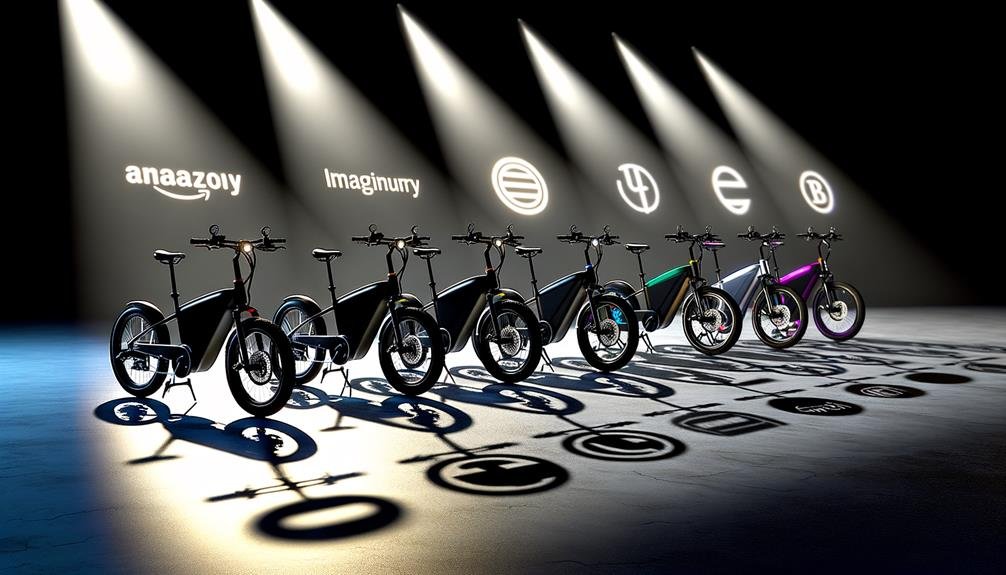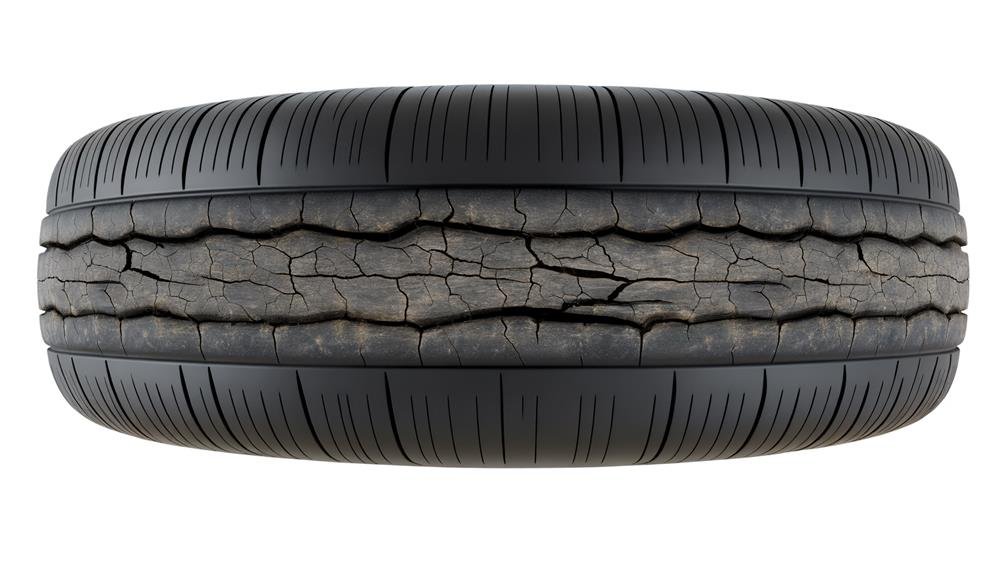Charles Miller is a veteran bike enthusiast with over 12 years of experience dealing with bikes as a mechanic. Despite immense love and expertise for...
As the appeal of eBikes continues to grow, many cycling enthusiasts are exploring the option of converting their traditional bikes into electric ones. The expense associated with this conversion is a fundamental aspect to consider, as it can vary significantly based on numerous factors such as the type of conversion kit, the bike's compatibility with the kit, and whether the installation is a do-it-yourself project or performed by a professional.
Our discussion will guide you through these variables and their impact on cost, ultimately assisting you in making an informed decision about whether converting your bike to an eBike is a feasible and worthwhile investment.
- Key Takeaways
- Understanding E-Bike Conversion
- Cost of Conversion Kits
- Evaluating Bike Compatibility
- Labor Costs Explained
- DIY Vs Professional Installation
- Potential Additional Costs
- Assessing Conversion Value
- Top E-Bike Conversion Kits
- E-Bike Conversion Legality
- Post-Conversion Maintenance Costs
- Frequently Asked Questions
- Conclusion
Key Takeaways
- E-bike conversion costs can vary depending on the type of kit and labor involved, with mid-drive kits typically costing between $1000 – $1500 and hub motor kits ranging from $500 – $1000.
- The cost of a battery pack for the e-bike conversion can range from $200 – $600, while installation labor costs can range from $100 – $200.
- It is important to carefully evaluate the compatibility of the bike, considering factors such as frame measurements, wheel size, brake system, and e-bike laws in the region.
- DIY conversion kits can range from $300 to $1500 or more, offering affordability but requiring careful consideration of the conversion process, cost implications, and the quality of the outcome compared to purchasing a pre-built electric bicycle.
Understanding E-Bike Conversion
In order to successfully convert a traditional bicycle into an electric one, it is crucial to understand the key factors that influence the selection of an e-bike conversion kit. These include compatibility with your bike, motor power, battery capacity, budget considerations, and the reputation of the brand.
Converting an old bike into an electric one requires an Electric Bike Conversion Kit that matches the bike's specifications, such as wheel size, brake type, and frame width. The motor power, measured in watts, and battery capacity, measured in watt-hours, profoundly impacts the e-bike's performance. The Best Electric Bike Conversion Kits offer a balance between power, battery life, and price.
The budget for E-bike conversion kits varies widely, from $300 to $1,500, and may be influenced by manufacturer rebates or tax credits. Brands like Bafang BBSHD, Tongsheng TSDZ2, and Swytch Universal are reputable and reliable.
While the prospect of converting a bike can be daunting, comprehensive research, understanding regional e-bike laws, and considering personal requirements can guide a successful bike conversion, turning your traditional bike into an efficient, eco-friendly electric version.
Cost of Conversion Kits
Having established the significance of understanding e-bike conversion, let's now examine a crucial factor in this process: the cost of conversion kits. To turn a regular bike into an e-bike, one needs to buy an electric bike conversion kit. The worth of these conversion kits largely depends on the type and quality, typically ranging from $1000 to $1800.
There are two main kinds: the mid-drive kit and the hub motor kit. The mid-drive kit is generally more expensive, yet it provides better balance and efficiency. The hub motor kit, moderately priced, is simpler and easier to install.
Here is an indicative cost breakdown:
| Item | Cost Range |
|---|---|
| Mid-drive Kit | $1000 – $1500 |
| Hub Motor Kit | $500 – $1000 |
| Battery Pack | $200 – $600 |
| Installation Labor | $100 – $200 |
Evaluating Bike Compatibility
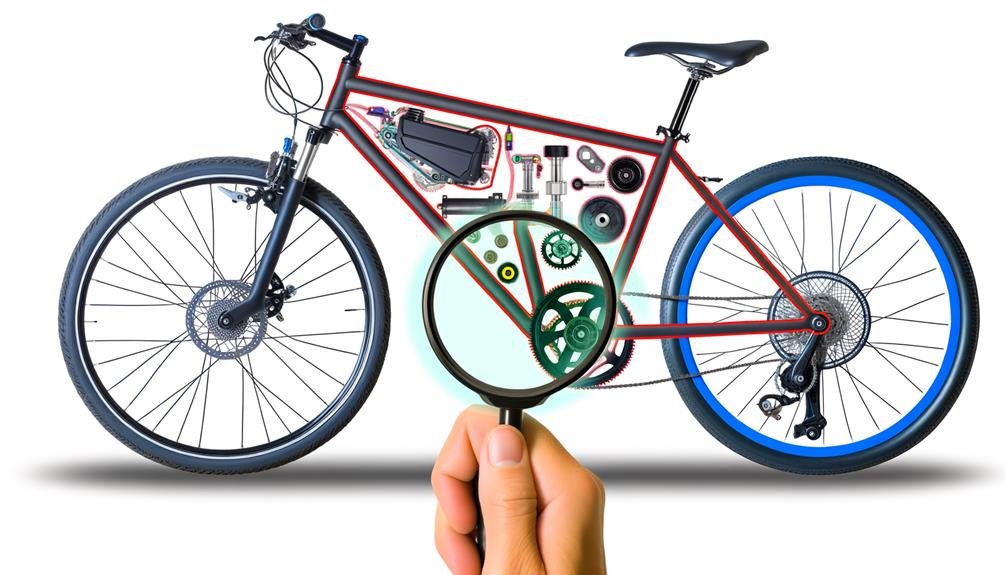
Before embarking on the conversion process, it is crucial to evaluate the compatibility of your bicycle with the intended electric bike conversion kit. Evaluating bike compatibility involves a meticulous examination of your bike's frame measurements, wheel size, and brake system to ensure they align with the specifications of the selected kit.
The drive e-bike conversion kit you choose, whether it's a mid-drive motor kit or a front or rear wheel kit, must fit your bike perfectly for optimal performance. The mid-drive motor kit, for instance, replaces your bike's crankset and requires your bike frame to have a specific bottom bracket size. The front or rear wheel kits replace one of your bike's wheels with a wheel with an integrated electric motor, hence you must ensure your bike's dropouts can accommodate the motor axle.
Furthermore, consider the range and journey requirements of your planned e-bike usage. Your kit should offer enough power and range to meet your needs.
Lastly, be aware of e-bike laws in your region to ensure your intended conversion aligns with local regulations. In essence, converting a bike to an e-bike requires careful evaluation of bike compatibility with your chosen kit.
Labor Costs Explained
When converting a bike to an ebike, labor costs are a significant factor to consider. These costs encompass not only the standard rates charged for the physical conversion process, but also the time investment involved and any potential hidden expenses.
This section will elucidate these elements to provide a comprehensive understanding of the labor costs associated with ebike conversion.
Understanding Labor Rates
Diving into the topic of labor rates, it's crucial to understand that the cost of converting a traditional bike into an eBike can vary significantly, with fees ranging from approximately $200 to $500 or more, contingent upon the intricacy of the conversion process. When you decide to buy an e-bike conversion kit, factors such as the bike's compatibility with a mid-drive conversion, or the need for a unique e-bike battery, can influence the labor rates.
Furthermore, the kit's ease of use and the level of customer support provided can also impact the overall cost. Despite these variables, converting a bike to an e-bike is generally an affordable option within the e-bike market, especially when compared to purchasing a new electric bike.
Time Investment Breakdown
Having examined the influence of various factors on labor rates, we now turn our attention to a comprehensive breakdown of the time investment required for installing an electric bike conversion kit. The process can range from a few hours to a full day, based on the complexity of the best e-bike conversion kit chosen.
This time investment breakdown is critical when considering the cost to convert a bike to an e-bike and evaluating the value for money. When buying a new kit, ensure the battery is included, as its installation can significantly affect the overall time investment.
The motor conversion and power output adjustments should be performed on a regular basis to maintain optimal performance. By understanding these elements, you can ensure a successful conversion and ongoing maintenance.
Hidden Labor Expenses
Understanding the intricacies of hidden labor expenses is pivotal to estimating the true cost of converting a traditional bike to an e-bike. These expenses can add approximately $200 to the price of an e-bike conversion kit.
The best electric bikes often utilize a mid-drive system, such as the Bafang or TongSheng Mid-Drive. These systems may require professional installation, which can potentially increase labor costs. Additionally, factors such as pedal assist, hub motors, and different battery sizes can also contribute to these expenses.
On the other hand, a friction drive conversion may seem cost-effective initially. However, the need for ongoing maintenance can result in higher overall labor costs. It is important to consider this when planning to convert a bike to an e-bike.
DIY Vs Professional Installation
When considering the conversion of a standard bicycle to an electric one, two primary installation options present themselves: Do-It-Yourself (DIY) or Professional Installation. Each method bears its own set of costs, benefits, and challenges which can greatly impact the overall conversion process and the functionality of the final product.
In the upcoming discussion, we will provide a detailed comparison of these two approaches, focusing particularly on cost implications, process requirements, and the quality of the outcome.
DIY Conversion Costs
In light of the financial considerations, the cost of a DIY conversion kit for bicycles can vary significantly, ranging from $300 to $1,500 or more, which is often a more affordable option compared to purchasing a pre-built electric bicycle.
When you decide to convert a bike to an e-bike, you need to buy a conversion kit that delivers the required motor power and has a reliable battery. To provide unbiased advice to help make this decision, consider the following factors:
- The cost of the kit and its components
- The motor power the kit delivers
- Battery life and efficiency
- Ease of installation
While DIY conversion costs may seem high initially, they can potentially save you money in the long run. The satisfaction of an easy installation and the joy of joining the e-bike community are added bonuses.
Professional Installation Prices
While the allure of DIY installation lies in its potential cost-saving benefits, one must consider professional installation prices, typically ranging from $200 to $500. This ensures proper fitting and significantly reduces the risk of errors during the conversion process.
When pondering 'how much does it cost to convert a bike to an ebike?' it's vital to factor in whether your chosen kits include a battery or not. Some expert buying guides suggest DIY conversion, but for many, professional installation is the safer route.
Reviews and expert buying opinions highlight the peace of mind that comes with professional fitting.
Potential Additional Costs
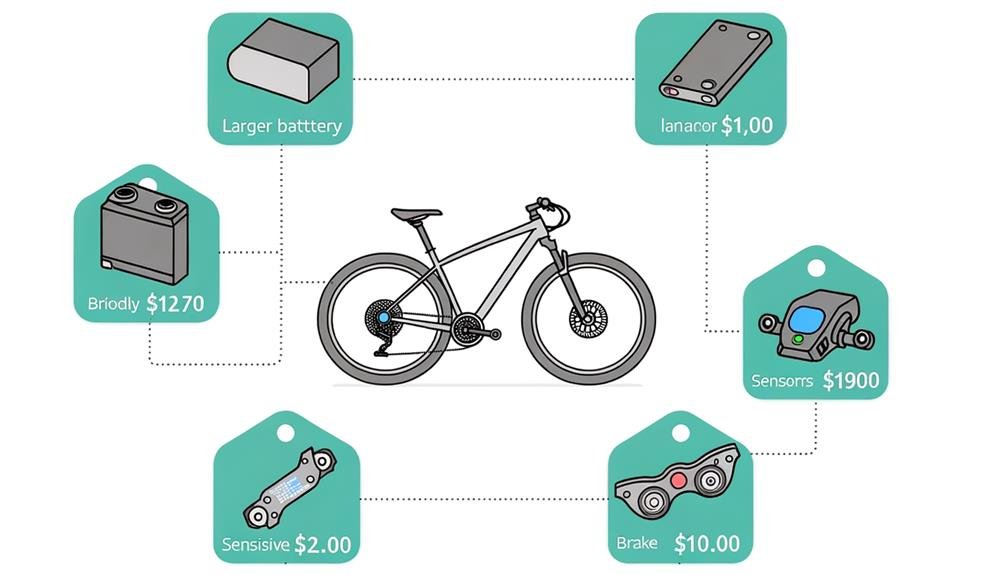
Beyond the initial purchase of the conversion kit, potential additional costs such as extra batteries, professional installation, repair expenses, battery compatibility issues, and ongoing maintenance can significantly impact the overall financial investment of converting a bike to an e-bike. This could make it as expensive as buying a brand new e-bike.
Here are some potential additional costs to consider:
- Additional batteries: Conversion kits like Bafang Front Hub Motor, Swytch system, or Tongsheng TSDZ might not include a battery, necessitating an extra purchase. This can significantly increase how much it costs to convert a bike to an e-bike.
- Professional installation: While you can do it yourself, professional installation will ensure optimal performance but could add around $200 to the cost.
- Repair expenses: Converted e-bikes may require more costly repairs than regular bikes due to their complex systems.
- Ongoing maintenance: Regular checkups and part replacements are necessary to keep the e-bike running efficiently.
Understanding these costs will help you choose whether to buy a new e-bike or convert your existing bike. The decision ultimately depends on your budget and technical skills.
Assessing Conversion Value
In evaluating the merit of converting a bike to an ebike, one must take into account the costs of the conversion kit and any professional installation fees. These financial considerations, along with the potential enhancement of your biking experience, constitute the overall conversion value.
It is crucial to weigh these aspects in a comprehensive manner to accurately assess whether the conversion process is a beneficial investment.
Conversion Kit Costs
Considering the cost of conversion kits for bicycles, which can range from $300 to $1,500 or more, they represent a cost-effective alternative to buying a new electric bicycle. When converting your bike to an e-bike, you must consider the ride quality and power the conversion kit provides. Here are a few considerations:
- The place where the motor sits can affect the ride quality due to extra weight.
- Conversion kit costs can be offset by potential savings when compared to buying a new e-bike.
- Products like Rubbee X offer cost-effective solutions in the United States.
- Higher-priced kits often provide greater power and improved ride quality.
In the end, assessing conversion value involves balancing cost, power, and ride quality.
Professional Installation Fees
Factoring in the cost of professional installation is another integral part of assessing the overall conversion value when turning a traditional bike into an e-bike. Professional installation fees typically range from $100 to $300, and are influenced by the complexity of the conversion kit and shop rates.
For instance, Mid Drive systems, which integrate motor powers into the bike's gearing system, bottom bracket, and crank arms, often necessitate professional installation due to their complexity.
Here's a table detailing key considerations:
| Consideration | Description |
|---|---|
| Wheel Sizes | Compatibility with the conversion kit |
| Disc Brakes | Impact on installation, potential adjustments |
| Cadence Sensor | Proper installation for effective performance |
| Bottom Bracket | Required modifications for Mid Drive systems |
Top E-Bike Conversion Kits

When selecting the ideal e-bike conversion kit, it is crucial to pay attention to compatibility factors such as wheel size, rim size, brake type, cassette and freewheel type, rear frame stay width, and front fork/shocks width. You should also consider performance considerations like motor power, battery capacity, and their influence on top speeds and range. This ensures the system is compatible with your road bike and provides a satisfying experience when riding the bike.
There are a number of top e-bike conversion kits in the market:
- Bafang BBSHD: High motor power, comes with a battery and an LCD display. Suitable for pedalling rather than full motor power, preferred for off-road and mountain biking.
- Tongsheng TSDZ2: A lighter, more efficient system best suited for road bikes, it offers a natural-feeling pedal assist mode.
- Grin Technologies All-Axle Hub Motor Kit: Front wheel hub motor kit with a huge range, regenerative braking, and compatibility with most bicycles.
- Swytch Universal eBike Conversion Kit: Compact, lightweight, and easy to install on any bike, it provides a good balance between power, range, and cost.
E-Bike Conversion Legality
While the technical aspects and performance considerations of e-bike conversion kits are indeed critical, one must not overlook the legal implications associated with their use. As enthusiasts in the testing cycling tech realm, we need to ensure that the kit we use is not only compatible with the bike but also adheres to the local regulations.
In many jurisdictions, e-bikes are subject to specific rules concerning power output, speed, and rider age. For instance, in some areas, bikes are not legally allowed to exceed 129 watts or travel over a certain speed per hour. To help us understand better, consider the table below:
| E-Bike Parameter | Legal Limit |
|---|---|
| Power Output | 129 watts |
| Speed | Varies per location |
| Rider Age | Varies per location |
| Kit Compatibility | Must be compatible with the bike |
Post-Conversion Maintenance Costs
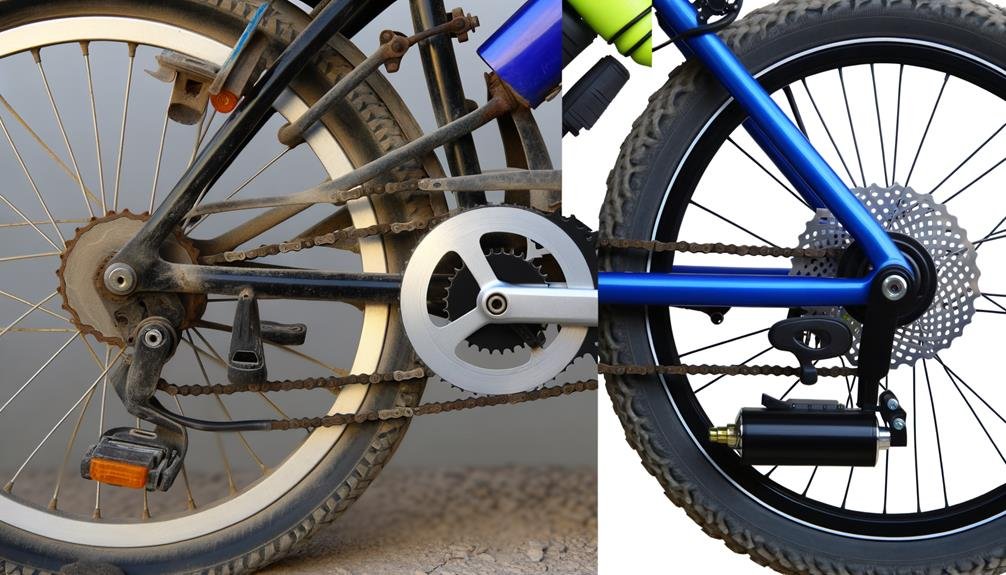
Transitioning to an e-bike requires a keen understanding of the associated post-conversion maintenance costs, which can encompass regular servicing of the motor, battery, and electrical components. Maintenance costs for your e-bike may include:
- Regular servicing of the motor and electrical components to ensure optimal performance.
- Battery replacement or reconditioning after a certain number of charge cycles.
- Increased wear and tear on the drivetrain due to the higher torque and increased power of an e-bike.
- Regular inspection and maintenance of electrical wiring and connections for safety.
Additional costs may arise from the need for specialized tools or professional assistance for maintenance and repairs. As a leading digital publisher, we strive to always share honest, detailed, and technical information to provide the best support for our readers.
As part of the tech group and leading digital publisher, we believe in empowering our readers with today's best advice on e-bike conversion. We, along with our trusted partners, will always aim to provide better support for the e-bike community. By considering and understanding these costs, you agree to be better equipped for the journey of e-bike conversion.
Frequently Asked Questions
Is It Worth Converting a Bike to Electric?
The worthiness of converting a bike to electric hinges on factors such as potential electric conversion benefits, battery life considerations, professional conversion services, maintenance post-conversion, and an analysis of environmental impact.
How Much Does It Cost to Convert a Bike to an E-Bike?
Converting a bike to an e-bike typically costs between $500 to $1500, factoring in conversion kits, battery choice and whether DIY or professional services are used. Cost can also depend on maintenance, safety and performance post-conversion.
Can Any Bike Be Converted to Ebike?
Yes, most bikes can be converted to eBikes using a conversion kit. The process requires specific tools and pre-conversion considerations. Post-conversion maintenance, battery choices, and legal implications should also be factored into the decision.
What Is a Good Bike to Convert to Electric?
When choosing a bike for electric conversion, consider brands suitable for mountain, road, commuter, and hybrid conversions. Budget, customization options, and suitability for folding and cruiser ebikes are also important considerations.
Conclusion
In conclusion, the cost of converting a conventional bicycle to an eBike is influenced by varying factors such as the conversion kit's price and quality, bike compatibility, and labor costs.
It represents an investment into sustainable transportation and personal convenience. The value is not just monetary, but also symbolizes a commitment to eco-friendly practices and technological innovation.
As the eBike conversion journey unfolds, one must also consider legality and post-conversion maintenance.

Charles Miller is a veteran bike enthusiast with over 12 years of experience dealing with bikes as a mechanic. Despite immense love and expertise for his Tacoma, he rides his Trek Ebike more. Anytime you meet him, you’ll either hear him talking about Bikes, or writing about all things bikes and cars on this blog.
More Posts
